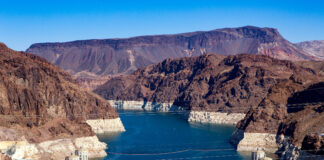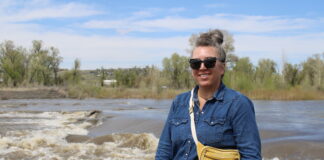
By Heather Sackett
Glenwood Springs has received approval for a loan of up to $8 million from the state to upgrade its water system to deal with the impacts of this past summer’s Grizzly Creek Fire.
The Colorado Water Conservation Board approved the loan for system redundancy and pre-treatment improvements at its regular meeting Wednesday. The money comes from the 2020 Wildfire Impact Loans, a pool of emergency money authorized in September by Gov. Jared Polis.
The loan will allow Glenwood Springs, which takes most of its municipal water supply from No Name and Grizzly creeks, to reduce the elevated sediment load in the water supply taken from the creeks as a result of the fire, which started Aug. 10 and burned more than 32,000 acres in Glenwood Canyon.
Significant portions of both the No Name Creek and Grizzly Creek drainages were burned during the fire, and according to the National Resources Conservation Service, the drainages will experience three to 10 years of elevated sediment loading due to soil erosion in the watershed. A heavy rain or spring runoff on the burn scar will wash ash and sediment — no longer held in place by charred vegetation in steep canyons and gullies — into local waterways. Also, scorched soils don’t absorb water as well, increasing the magnitude of floods.
The city will install a sediment-removal basin at the site of its diversions from the creeks and install new pumps at the Roaring Fork River pump station. The Roaring Fork has typically been used as an emergency supply, but the project will allow it to be used more regularly for increased redundancy. During the early days of the Grizzly Creek Fire, the city did not have access to its Grizzly and No Name creek intakes, so it shut them off and switched over to its Roaring Fork supply.
The city will also install a concrete mixing basin above the water-treatment plant, which will mix both the No Name/Grizzly Creek supply and the Roaring Fork supply. All of these infrastructure improvements will ensure that the water-treatment plant receives water with most of the sediment already removed.
“This was a financial hit we were not anticipating to take, so the CWCB loan is quite doable for us, and we really appreciate it being out there and considering us for it,” Glenwood Springs Public Works Director Matt Langhorst told the board Wednesday. “These are projects we have to move forward with at this point. If this (loan) was not an option for us, we would be struggling to figure out how to financially make this happen.”
Without the improvement project, the sediment will overload the city’s water-treatment plant and could cause long, frequent periods of shutdown to remove the excess sediment, according to the loan application. The city, which provides water to about 10,000 residents, might not be able to maintain adequate water supply during these shutdowns.
According to the loan application, the city will pay back the loan over 30 years, with the first three years at zero interest and 1.8% after that. The work, which is being done by Carollo Engineers and SGM, began this month and is expected to be completed by the spring of 2022.
Langhorst said the city plans on having much of the work done before next spring’s runoff.
“Yes, there is urgency to get several parts and pieces of what the CWCB is loaning us money for done,” he said.
The impacts of this year’s historic wildfire season on water supplies around the state was a topic of conversation at Wednesday’s meeting. CWCB Director Rebecca Mitchell said her agency has hired a consultant team to assist communities — through a watershed restoration program — with grant applications, engineering analysis and other support to mitigate wildfire impacts.
“These fires often create problems that exceed impacts of the fires themselves,” she said. “We know the residual impacts from these fires will last five to seven years at minimum.”
Aspen Journalism is a local, nonprofit, investigative news organization covering water and rivers in collaboration with The Glenwood Springs Post-Independent and other Swift Communications newspapers. This story ran in the Nov. 19 edition of the Glenwood Springs Post-Independent and the Nov. 19 edition of Aspen Journalism.
The Water Desk’s mission is to increase the volume, depth and power of journalism connected to Western water issues. We’re an initiative of the Center for Environmental Journalism at the University of Colorado Boulder. The Water Desk launched in April 2019 with support from the Walton Family Foundation. We maintain a strict editorial firewall between our funders and our journalism. The Water Desk is seeking additional funding to build and sustain the initiative. Click here to donate.





